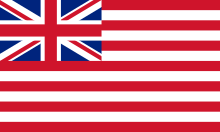東印度公司

東印度公司(英文:The East India Company),又叫做英屬/英國東印度公司(English East India Company[1]),1707年聯合法令(Treaty of Union)簽訂之後,又叫(British East India Company)[2]。1600年英倫女王伊利沙伯一世頒發皇家特許狀之後成立嘅特許公司,大航海時代歐洲嘅聯合股份公司(Joint-stock company)之一[3]。公司初頭係開來同東印度群島做生意,搞搞下變咗主要同印度次大陸同中國做生意,係歐洲各國入邊最先開嘅一間東印度公司。公司喺英國政府中有特殊地位。就係咁,佢好多時得到好多着數,包括各頂專利同豁免,咁搞到國內對手好唔妥佢,皆因公司着數得過份,好唔公平。之不過,就算咁樣,二百五十年來,東印度公司都維持到強者地位。
名[編輯]
公司喺成個發展歷程度有過合拼,大概可分成兩個時期。早期係專司東印度羣島生意嘅倫敦商人之總督及公司(Governor and Company of Merchants of London Trading into the East Indies),有揸英國皇家特許狀(Royal Charter),呢份認證係由女王伊利莎伯喺一六〇〇年十二月卅一號發嘅。[4]
到咗十七世紀後期,亦有其他啲英國公司,如英國東印度貿易公司(East India Trading Company),想挑戰佢嘅壟斷地位。最後喺一七〇八年公司同其他公司合併咗,轉成專搞東印度羣島生意嘅商人聯合公司(United Company of Merchants of England Trading to the East Indies),自此亦有咗第個名尊貴東印度公司(Honourable East India Company[5],減筆 HEIC[6])。因爲係聯合公司,亦叫聯合東印度公司(United East Indian Company,因拉丁文U/V可混用,又寫Vnited East Indian Company,減筆VEIC)。公司有花名叫莊公司(John Company)[7]。喺印度又叫Company Bahadur(Hindustani bahādur, "brave"/"authority")[8]。
擴張同解散[編輯]
東印度公司做生意,以棉花、絲、硝石、茶同鴉片爲主。公司唔單止係做生意,佢仲憑軍力同行政手段,兼統治咗印度度好大片土地。公司治印度,始自一七五七年,巴叻士之戰(Battle of Plassey)後。到咗一八五八年,喺一八五七年印度之亂(Indian Rebellion of 1857)而終。一八五八年英國立法,名一八五八年印度政府法案(Government of India Act 1858),改由英國皇家直管印度,成爲咗印度之王。公司最後喺一八七四年一月一號,因東印度公司股息贖回法案(East India Stock Dividend Redemption Act)而解散,股東得印度政府債券做補償,而女王域多利,就成爲首任印度皇帝(Empress of India)。
涉足嘅生意[編輯]
印度嘅紡織品[編輯]
東印度公司早期集中搞香料貿易,其後業務趨向多元化,先至涉足咗印度嘅紡織品業,將當地啲產品同埋新名詞帶咗入英國,好似印花大手巾bandana、未經漂染嘅粗白棉布calico、印花棉布chintz、粗棉布dungaree、格仔棉布gingham、泡泡紗seersucker、塔夫綢taffeta等。
中國大陸嘅茶品[編輯]
由1660年代開始英國人就好熱愛啲茶葉,茶葉就成為咗貿易公司嘅主要利潤來源,到咗1700年代,茶葉嘅消耗量係每18年就升一倍。而英國東印度公司一路係每年派商船,喺廣州(Canton)停留幾個月入啲茶貨[9]。
分支機構[編輯]
東印度公司設喺廣州嘅英屬廣州商館(The British East India Company's Canton Factory),係歐美各國最早喺廣州設立嘅商館 (Factory),又叫做夷館,「為夷人居停之所」。隨着1757年清廷改定廣州做唯一嘅貿易港,廣州商館就成咗東印度公司代表英國、有著對華貿易壟斷權嘅官方組織,直到1834年東印度公司嘅對華貿易壟斷權被取消前,廣州商館係實際主導咗大清同大英間嘅關係[10]。
睇埋[編輯]
註[編輯]
- ↑ "East India Company | Definition, History, & Facts | Britannica".
- ↑ 1. Columbia Encyclopedia 2007, "East India Company, British" 互聯網檔案館嘅歸檔,歸檔日期2009年2月12號,.. 2. Marx, Karl (25 June 1853), "The British rule in India", New York Daily Tribune republished in Carter, Mia; Harlow, Barbara (2003), Archives of Empire, Raleigh: Duke University Press. Pp. 802, ISBN 0822331640. Quote (p. 118): "I do not allude to European despotism, planted upon Asiatic despotism, by the British East India Company, forming a more monstrous combination than any of the divine monsters startling us in the temple of Salsette."
- ↑ The Dutch East India Company was the first to issue public stock.
- ↑ The Register of Letters &c. of the Governor and Company of Merchants of London trading into the East Indies, 1600–1619. On page 3, a letter written by Elizabeth I on 23 January 1601 ("Witnes or selfe at Westminster the xxiiijth of Ianuarie in the xliijth yeare of or Reigne.") states, "Haue been pleased to giue lysence vnto or said Subjects to proceed in the said voiadgs, & for the better inabling them to establish a trade into & from the said East Indies Haue by or tres Pattents vnder or great seale of England beareing date at Westminster the last daie of december last past incorporated or said Subjecte by the name of the Gournor & Companie of the merchaunts of London trading into the East Indies, & in the same tres Pattents haue geven them the sole trade of theast Indies for the terme of XVteen yeares ..."
- ↑ A. Oxford English Dictionary (Draft Edition, September 2008, requires subscription) entry for "honourable": "2b. Applied as an official or courtesy title of honour or distinction." Usage: ... the prefix ‘Honourable’ ... is also applied to the House of Commons collectively; ... also formerly to the East India Company, etc. Examples: 1698 FRYER Acc. E. India & P. 38 "In pay for the Honourable East India Company." B. Encyclopaedia Britannica 1911 互聯網檔案館嘅歸檔,歸檔日期2011年5月25號,., "HONOURABLE (Fr. honorable, from Lat. honorabilis, worthy of honour), a style or title of honour common to the United Kingdom, the British colonies and the United States of America.... The epithet is also applied to the House of Commons as a body and to individual members during debate ('the honourable member for X.'). Certain other corporate bodies have, by tradition or grant, the right to bear the style; e.g. the Honourable Irish Society, the Inns of Court (Honourable Society of the Inner Temple, &c.) and the Honourable Artillery Company; the East India Company also had the prefix 'honourable' . The style may not be assumed by corporate bodies at will, as was proved in the case of the Society of Baronets, whose original style of 'Honourable' Society was dropped by command." C. Birdwood, George (1891), Report on The Old Record of the India Office, London: W. H. Allen & Co., Limited, and at Calcutta Quote (p. 14): "The English Company [Including The General Society chartered by William III, 3 September 1698] trading with the East , commonly called "the New Company," was incorporated by William III, 5 September 1698; its charter running to 1714. The above Company of Merchants of London and the English Company, were finally incorporated under the name of "The United Company of Merchants of England trading to the East [commonly styled, "the Honourable East India Company"] in 1708-9."
- ↑ Hawes, Christopher J. (1996), Poor Relations: The Making of a Eurasian Community in British India, 1773-1833, London: Routledge. Pp. 217., ISBN 0700704256 Quote (p. xiii): "Abbreviations: Honourable East India Company (HEIC)."
- ↑ Ride, Lindsay; Ride, May; Mellor, Bernard (1995), An East India Company Cemetery: Protestant Burials in Macao, Hong Kong: Hong Kong University Press. Pp. 304, ISBN 9622093841 Quote (p. 7): "In 1709, the Company amalgamated with a rival group, which had been chartered in 1698 by William III. This union took the title 'The Honourable East India Company,' which was shortened for general use to 'the Honourable Company' and more often still to John Company, until it ceased operations in 1834, after its monopoly of British trade with China was discontinued."
- ↑ Gandhi, M. K. (1997), Hind Swaraj and other writings, (Edited by Anthony J. Parel) Cambridge and London: Cambridge University Press. Pp. 208., ISBN 0521574315. Quote (p.39): "... They came to our country originally for the purpose of trade. Recall the Company Bahadur.† Who made it Bahadur? They had not the slightest intention at the time of establishing a kingdom. Who assisted the Company's officers? Who was tempted by their silver? Who bought their goods? History testifies that we did all this. ... †: 'the Company Bahadur': an honorific title by which the East India Company was known among Indians. 'Bahadur' means brave, powerful, sovereign."
- ↑ 統治半個世界的大企業 國泰航空 2017-08-28
- ↑ 英國東印度公司廣州商館的漢語教學及其影響 譚樹林 孔令雲 澳門特區政府文化局
